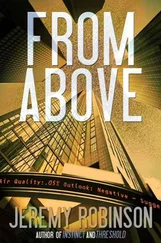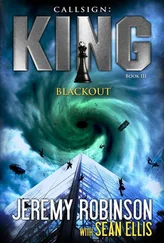Vesely and Miller looked at each other and then to the river of hot water.
“He saw a cryogenically frozen Nazi,” Miller said. “Being thawed.”
The revelation further solidified Miller’s opinion that Dulce was the place to go.
“Dulce is underground base. Some say tunnels from base stretch far away. Some say across continent. But most believe a tunnel—a high-speed rail—goes to Los Alamos.”
“The laboratory?” Hammaker asked.
Vesely nodded. “If they can become directors of NASA, why not national laboratory? If Kammler wanted a modern think tank there is no better place to start.”
Miller stood, walked to his clothes, and picked up his underwear. Warm and dry. He slipped them on. “So what’s our move? Infiltrate Los Alamos and search for the rail? Or go straight to Dulce and kick in the front door?”
Hammaker raised his hand. “Do I get a say, since I got a code name?”
“He gave you a code name?” Vesely said.
“The Kidd,” Hammaker said. “Two Ds.”
“Like Billy the Kid,” Vesely said. “I like.”
“I knew you would,” Miller said, and turned to Hammaker. “What are you thinking?”
“Kick in the front door,” The Kidd said. “Kill every Nazi son of a bitch you find.”
Miller grinned as he pulled his black pants up and cinched the belt tight. “That’s exactly what I was thinking.” He put his shirt on next. “But the only way that’s going to happen is if we leave. Now.”
Vesely stood and began dressing.
“That’s not possible.” Hammaker looked from Vesely to Miller. “There’s hundred-mile-per-hour gusts up there. Blinding snow. Twenty feet visibility if we’re lucky. And it’s night. Going to be for like eight more hours.”
“We don’t have eight hours,” Miller said. “We’ve been here too long already.”
“But—”
“Kidd, impossible sums up my entire week. I survived Miami, two hit squads, a rogue F-22, a traitor, and I was almost melted alive. There is no way I’m going to let a little wind and snow stop me now. I know you weren’t looking to take risks when you enlisted, but you did enlist, you’re here, and if you want to keep that code name, you better grow a set of balls right this second and say you’re going to fly us out of here.”
Hammaker looked on the verge of panic, but dug down deep, set his serious eyes on Miller’s, and said, “On one condition.”
“What?”
“I want in,” he said. “On all of it. Dulce. Los Alamos. Whatever. I want in.”
Miller nodded, slung his MP5 over his shoulder, and took the flash drive out of the laptop. “You got it.”
Ten minutes later, after leaving the gorge and entering the below-freezing Antarctic storm, both men reconsidered the wisdom of their decisions. But there was no turning back. The white flakes that shot through the nighttime air and stung the skin like angry wasps were nothing compared to the red flakes that would soon envelop the planet.
The big helicopter lurched to the right just ten feet above the Antarctic landing pad. Miller couldn’t see the ground—the nighttime sky and blanket of snow blinded him—but his stomach and the helicopter’s altitude indicator twisted in tandem. If they rolled much further, the rotor blades might strike the ice and their flight would be one of the shortest in the history of avionics.
Several warning indicators flashed. Alarms sounded. Miller wanted to slap the helicopter. Tell it to stop screaming like a little girl. But all he could do was hang on and trust The Kidd.
Hammaker fought the storm for control of the aircraft. While they were still far from vertical, the altimeter showed them rising slowly. At an angle.
Miller searched his memory. What had the surroundings looked like? They were surrounded by flat ice, but there had been mountains inland, to the east. He found the compass. They were facing north, but moving west.
As they continued to rise, the helicopter’s roll leveled out. Hammaker turned to Miller. “Sorry about that. Wind was intense.”
“That Katabatics,” Vesely said from the back. “Luckily they flow out to sea, which is where we want to go.”
“We’ll make it to sea,” Hammaker said. “But landing on the George Washington in this mess is going to be a trick.”
The chopper shuddered and dropped fifty feet.
“Storm is reminding us who is in control,” Vesely said.
A gust struck the chopper’s side, rolling them to the left. Miller sensed that if he could see, he’d be looking down at the ground through his window. The helicopter was close to tipping.
Either God heard someone’s quickly-said prayer or Hammaker was the best damn closet-pilot in the navy, because the helicopter righted and all three men sighed with relief.
Miller looked at the GPS screen. They were headed in the general direction of the George Washington, but couldn’t see beyond the helicopter’s nose. He picked up the radio transmitter.
“ George Washington, George Washington, this is Lieutenant Lincoln Miller. Do you read? Over.”
There was a moment of silence and Miller opened his mouth to repeat his message, but then heard, “Miller, this is the George Washington, Ensign Partin speaking, reading you five by five. Are you all safe? Over.”
“That remains to be seen,” Miller said. “We are en route, over.”
“Did you say you were on your way here?” For a moment, Miller waited for the man to say over, but the surprise in his voice marked a shift in the conversation from trained radio operators to normal conversation.
“We’re a mile out and closing on your position,” Miller said. “But we can’t see anything. Do me a favor and light that boat up like it’s the Fourth of July. Over.”
Miller expected a statement of shock or outrage, but all Partin said was, “Copy that. Consider it done. Out.”
For a moment he thought the change in the man’s demeanor was strange, but then he remembered that the ship was missing the majority of its crew, and Partin might actually have to run around switching on the lights himself.
Two nerve-wracking minutes passed as the helicopter pitched, rolled, and shook. Had the helicopter been a news chopper and not an aerial tank designed to handle extreme weather and machine-gun fire, they would have crashed long ago. That wasn’t to diminish The Kidd’s piloting abilities. He was better than he claimed. But the chopper was a beast.
“There she is!” Hammaker shouted.
Time seemed to pass more quickly as they closed the distance to the ship, but as soon as they descended over the George Washington ’s deck, a new level of hell gripped the helicopter. The lower they flew, the stronger the wind became. The Katabatics rolled down Antarctica and spilled out over the ocean. That was normally bad enough, but the storm added power to the wind and turned the normally unidirectional force into an omnidirectional maelstrom. Giant waves, fifty to seventy-five feet tall, hammered the aircraft carrier. The massive vessel surged up and down, its decks repeatedly drenched with freezing seawater.
They could see the lights blazing on the deck, rising and falling with the waves, but there were no colorfully clad crew on deck to guide them down. No one was that stupid. They were on their own.
The helicopter spun as Hammaker guided it down. Sweat dripped down his forehead. “C’mon,” he said to the helicopter. “C’mon!”
A gust of wind sent them flying to the side.
Miller saw the control tower come into view as they flew toward it, seconds away from becoming a bloody, oily smear on the metal wall. Then they tilted away. After leveling out again, Miller could see the deck just ten feet below.
Читать дальше












